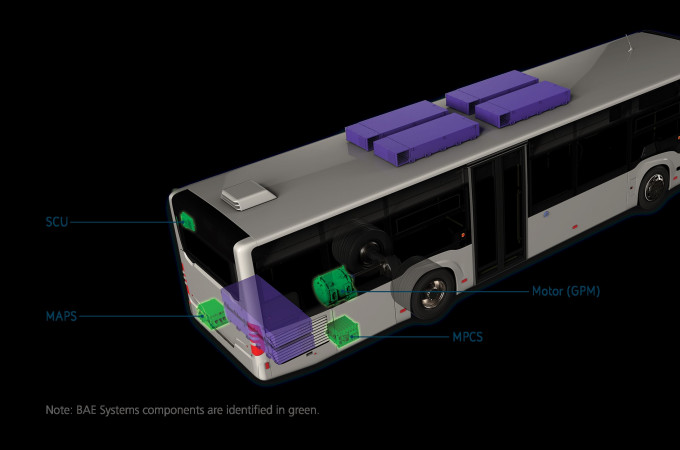Orders mounting for BAE Systems’ electric powertrain business in North America
By Jim Gibbins - 22nd June 2023

BAE Systems GEN 3 components MPCS (Left), Electric Motor (Middle) & MAPS (Right)
USA - The Power & Propulsion Systems division of BAE Systems Inc. based in Endicott, New York in recent months has enjoyed a steady stream of orders from its North American transit bus customer base for its third generation (Gen3*) electric powertrain and control system for hybrid, battery electric and hydrogen fuel cell electric medium- and heavy-duty vehicles.
,-Electric-Motor-(Middle)-&-MAPS-(Right).jpg)
BAE Systems’ GEN 3 components MPCS (Left), Electric Motor (Middle) & MAPS (Right)
Since March this year, five notable contracts have been announced by transit bus builders in North America, with cumulative orders totalling 1,805 units for deliveries taking place over the next two to three years.
March saw long term partner client, Canada’s Nova Bus Corporation of Saint-Eustache, Québec, announce an order for five 40-foot electric buses from the Washington Metropolitan Area Transit Authority, the public transport agency which serves the District of Columbia. More orders are expected in due course.
This was followed in April by the announcement that the company is to supply the new Gen3 electric power and propulsion system in three ElDorado National California Inc. (ENC) Axess EVO-FC hydrogen fuel cell (HFC) buses for operation in Rochester, New York. (Importantly, this order is the first time BAE Systems’ Gen3 electric drive system has been installed into a hydrogen fuel cell bus). BAE Systems’ drive system is being integrated with Latham, New York-based Plug Power Inc.’s 125kW Progen hydrogen fuel cell engine. (It was in April 2021 the two companies (Plug Power and BAE Systems) announced a collaboration to provide hydrogen-based electric propulsion systems and fuelling solutions for city bus fleets).
A major order followed in April/May with Nova Bus announcing North America’s biggest ever zero emission bus contract for up to 1,229 electric transit buses - a base order of 339 LFSe+, and options for a further 890 units - for delivery to towns and cities in the province of Québec. (The contract was awarded by the Société de transport de Montréal (STM) acting as agent in collaboration with the Association du Transport Urbain du Québec (ATUQ*)).
May 29th saw Nova Bus announce yet another major order, this time from Canada’s Toronto Transit Commission (TTC) for potentially 550 buses over the next four years. Nova Bus said it has been awarded a base order of 124 LFSe+ for delivery over a two-year period starting in 2024, with a potential additional order of 12 buses and up to 405 units in options over the next four years. The buses on order are again its LFSe+ 40 foot long-range battery-electric bus model; this order makes it the first order of Nova Bus LFSe+ buses by the TTC. All buses will be built using BAE Systems’ Gen3 electric propulsion system.
Also, late May saw ENC announce it had secured another fuel cell order, this time for 19 Axess EVO-FC hydrogen fuel cell buses, from California public transit provider Foothill Transit. Powered by Plug Power’s high capacity fuel cell and BAE Systems Gen3 electric propulsion system, the Axess EVO-FC delivers range up to 400 miles and refuels in 12-20 minutes. (ENC claims it is the first bus manufacturer to complete the 12-year/500,000 miles FTA Altoona test for a Hydrogen Fuel Cell Electric powered bus in 2018).
Diversification into the truck sector
At ACT Expo 2023, held in Anaheim, California, in early May, BAE Systems announced it was officially collaborating with Eaton Corporation of Maumee, Ohio, to develop electric vehicle (EV) technology solutions for medium-duty truck applications. At the show it displayed a Class-7 pickup and delivery demonstration vehicle. More specifically the vehicles incorporated BAE Systems’ power-dense electric motor and advanced silicon carbide/gallium nitride power electronics suite (see BAE Systems - Gen3 - Modular Power & Control Systems (MPCS) PDF attached) together with Eaton’s proven medium-duty four-speed (4-speed) EV transmission (MD 4-speed EV Transmission is specifically designed for EV applications) to provide a comprehensive electric vehicle system for a variety of medium-duty vehicles.
In another development, a series of interviews with Steve Trichka, vice-president of the Power and Propulsion Solutions business held in March by trade publications in South America - including T&BB South America www.truckandbusbuilder.com.br - he revealed a new partnership was underway with an unnamed Brazilian commercial vehicle manufacturer, and that it is developing, a prototype medium-duty electric truck for the markets of Latin America. More details expected soon.
Strategically, after more than 25 years of experience in providing series hybrid and electric powertrains to the transit bus market, the company is now diversifying its electric driveline system into other market segments, focussing on those with similar duty cycles; namely the on-highway truck, port, marine, off-highway and defence market segments.
*Gen3 - A key feature of the latest Gen3 electric drive system is the modularity of the inverter control system - referred to by BAE Systems as its Modular Power Control System (MPCS), the main function of which is to control the primary traction motor - and the ability to add modules for additional battery storage capacity. BAE Systems’ MPCS allows Nova Bus to expand and / or reduce the battery capacity of each bus with relative ease, as its MPCS has additional battery combiners that allow an OEM to add additional battery packs to it.
BAE Systems’ Gen3 comprises four main products:
· The modular MPCS,
· The MAPS (Modular Accessory Power System), which provides the auxiliary AC and DC (28V) power for vehicle accessories, such as 3-phase AC control of systems like the air conditioning, power steering, air compressors etc,
· The GPM-12 permanent magnet electric motor,
· The SCU (System Control Unit), which provides an operator interface, system monitoring & control, and ensures optimal power flow to and from system components.



